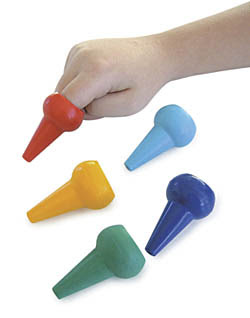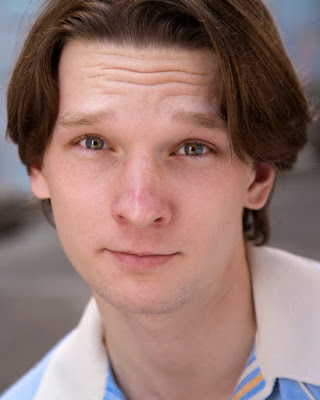I must not fear.
Fear is the mind-killer.
Fear is the little-death that brings total obliteration.
I will face my fear.
I will permit it to pass over me and through me.
And when it has gone past I will turn the inner eye to see its path.
Where the fear has gone there will be nothing.
Only I will remain.
Wednesday, September 23, 2009
Litany Against Fear
Tuesday, September 22, 2009
The Pesky Nature of Right and Wrong in Art
 As a child I took pride in being a good student. I was quiet when the teacher spoke, I raised my hand at every question, and I aced every test. Not so surprisingly, I've discovered there is little advantage to being a teacher's pet in the real world, in fact it can be diametrically opposed to the goal of being an actor.
As a child I took pride in being a good student. I was quiet when the teacher spoke, I raised my hand at every question, and I aced every test. Not so surprisingly, I've discovered there is little advantage to being a teacher's pet in the real world, in fact it can be diametrically opposed to the goal of being an actor.Sunday, September 13, 2009
Headshots: Now Retouched
 |
| From JPEG |
Friday, September 11, 2009
New Headshots: Please Help Me Pick
Comedic / Commercial: Can you see me on Scrubs? As the Dell Guy?
Dramatic: A guest star on Law & Order, I'm the guy trying to get away with murder.
Begley and Clark are both great guys and they are currently running a special. You can get 3 looks for just $150. The special runs through the end of September 2009.
"And God Created Great Whales" by Rinde Eckert

An Introduction
Tonight's show, "And God Created Great Whales" dealt with many of the themes present in his other pieces: obsession, the muse, and great art as an escape from death. In “Whales,” Eckert wrestles with Herman Melville’s Moby Dick. It’s a dense and unforgiving tome and many films and operas have drowned themselves in its murky depths. I read Moby Dick for kicks in high school and hated it. In my book report, I described it as a 19th-century whaling instruction manual with a lot of homoerotic undertones. So I was curious to know what Eckert could possibly do with such a foundation.
Wisely, Eckert puts Moby Dick at the center of his story but ensures it isn’t what the story is about. It serves as a foil against which to place his protagonist: a piano tuner desperately trying to finish composing his operatic adaptation of “Moby Dick” before he loses the last shred of his memory to a brain-wasting disease.
“...You will forget many things. Eventually you will forget how to breathe. In effect, you will be drowning in your ignorance.”
An Inauspicious Beginning
The play starts with Eckert at the piano, head down, with a tape recorder hanging on thick rope from his neck. Frozen and barely conscious he taps out a delicate refrain on the piano, and then he plays it again, and again, and again.
Oh no. This is going to be one of those pieces. Eckert’s body is frozen except for the same few fingers caressing the keys. Wow, we’re going to be staring at his head for a long time. Then a shout from off-stage. Oh thank goodness, we can move on from these same 3 notes. Then a person wearing all black runs down the aisle. Is that a character? Lights flicker above. Mumbling and shouts from off-stage. The person in all black, making no effort to conceal their presence runs back through the house. Okay, so this show is going to be really Meta, all of life is a stage and we are but players, I get it.
Eckert is still frozen in time, bald head gleaming in the spotlight, the same notes are repeated. God this is repetitive. Couldn’t the director have directed? Then, a voice comes through the speakers “Excuse me folks, but we’re encountering some technical difficulties. We need 3 minutes to run a new light board up to the booth.” Eckert stops playing the piano, stands, and walks off stage. 10 minutes pass as stage hands frantically run-about trying to make the necessary technical fixes. The voice comes back on the PA “Okay, we’re ready to start. Please take your seats. Sorry about that.”
The lights come down and Eckert makes his way to the stage. The lights come up, he begins again. The first three notes are followed by a light cue, a spotlight, then a black out. The music changes. The lights come back up, we see a woman on stage, dressed in Red – The Muse. She says “Press Play.” Eckert’s character, as if discovering it for the first time sees the tape recorder on his neck and timidly presses play. Nothing happens. He presses again. Nothing happens. He takes out the tape, returns it, and presses play. Nothing happens. Still exploring, as a child might, he presses play and stop, and play. Nothing. Oh God, it really is one of those plays, the audience sighs collectively. At this moment, Eckert looks up and drops the character. “Alright, we’re going to stop here. There seems to be some sort of technical gremlin at work, and they invariably come in bunches.” Crazed theater techs run into the house, and bumble about like a bad Marx Brothers routine.
A Consummate Professional
Eckert, a consummate professional, spent the next 15 minutes entertaining the audience. He was funny, warm, and seemed largely unaffected by the technical shitstorm that was raining on his performance. He told stories of past technical foibles so painful to watch that at one performance, a member of the band Cream ran up to Eckert at intermission to hug him and say that he was doing “A really good job considering the circumstances.” When his war stories were exhausted and techs were balancing precariously on a ladder just to his left, he joked “Well, I suppose we could do the talk back before the show.” Instead, he staged an impromptu classical recital – the repairs took so long he eventually took requests. “Mozart!” shouted the college kid with the AC/DC t-shirt. Finally, when the technical issues were resolved, he settled back into character: head down at the piano, fingers on the keys.
The Show
The performance was stunning and definitely not one of those shows. The singing by both actors was both powerful and nuanced. There were moments of genuine theatrical magic between Eckert and his Muse. Using nothing more than a piece of dowel and body movement they created an entire ship on a vast ocean doing battle with a monstrous whale. The piano tuner’s descent into infancy was tragic, made doubly so by the passion with which he fought to complete his masterpiece before his disease robbed him of his capacity to do so.
The Talk Back & Origin Story
After the show, Rinde took questions from the audience. His answers were eloquent and roaming, flitting from topic to topic, inspiration to inspiration. Eckert is brilliant man; a polymath with a palpable love of ideas and great desire to share that amorous curiosity with the world. When asked, he shared the origin of the story:
Eckert’s grandmother, an incredibly talented pianist and organist was diagnosed with Parkinson’s Disease and slowly slipped away from the world. He saw the abject terror she experienced when she didn’t recognize her family who were looking to her with such great expectation. It was here that he started to think of memory as something precious. Memory is something powerful; it frees us to create amazing works. It is also something we use constantly and take for granted. It is both mythic and mundane.
For those living in the 1800s, the whale was similarly impressive yet common. It was an astounding creature, revered in bourgeois society, something which most would never see. At the same time, whale oil was used in lamps, baleen in combs, and the rest of the creature in sundry banal endeavors. The whale is both mythic and mundane.
Eckert’s view is that Moby Dick is a story about more than obsession; otherwise it would be a historical footnote. Instead, he says, it is about our search for the divine borne of our understanding that we are not whole. Ahab must chase the whale, and the piano tuner must write his opera, and even though the end for both is nigh, through their bold pursuit they might both achieve some modicum of grace.
Performance Information
1117 W. 24th Street, Los Angeles
Admission is free.




